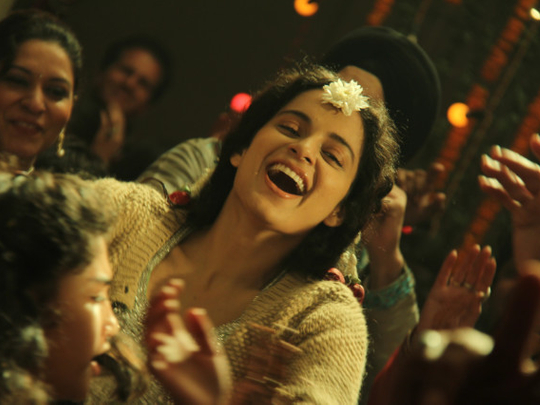
The countdown has begun for naming India’s official entry in the Best Foreign Language Film category of the 87th Academy Awards, which will be held on February 22, 2015, in Los Angeles.
A record number of films — as many as 30 — are in the fray, according to Supran Sen, secretary general of the Film Federation of India (FFI), tasked with inviting nominations and screening them for a jury that zeroes in on one movie to represent the country at the Oscars.
“The sheer number of nominations this year shows that India’s film industry — one of the biggest and most profitable globally — is hooked on the golden statue,” Sen told tabloid!.
“Never before had so many producers thrown their hats into the Oscars ring. The previous best was 25 in 2001 when we picked Lagaan. A nomination fee of Rs50,000 [Dh3,018] charged by FFI has obviously not been a deterrent.”
A secret jury has been assessing the nominations — 13 Hindi films, seven Marathi, three Bengali, two Tamil, two Telugu and one Kannanda, Konkani and Malayalam each — in the southern city of Hyderabad since September 18. According to a source, the jury’s first task was to shortlist 12 films.
India’s Oscar contender will be announced by the 16-member jury on Tuesday or Wednesday, Sen said. Interestingly, the jury members will also be named along with India’s official entry. An FFI official disclosed that names of jury members are being deliberately kept under wraps to discourage lobbying and harassment rampant in the past.
The media hype notwithstanding, no Indian film has ever won an Oscar in the Best Foreign Film category. The closest an Indian film came to winning in this category was in 1958 when Mehboob Khan’s Mother India lost by a single vote to Nights of Cabiria (Italy) at the 30th Academy Awards — a defeat by a whisker Bollywood still rues.
The biggies slugging it out now are Vikas Bahl’s Queen, Omung Kumar’s Mary Kom, Pradeep Sarkar’s Mardaani, Hansal Mehta’s Shahid, Syed Ahmad Afzal’s Youngistan amd Karan Johar’s 2 States among Hindi films.
The Marathi contenders are Abhijit Panse’s Rege, Paresh Mokashi’s Elizabeth, Nagraj Manjule’s Fandry and Ritiesh Deshmukh’s Yellow.
The Telugu films in the fray are Minugurulu, directed by Ayodhya Kumar Krishnamsetty, and Manam directed by Vikram Kumar, while the Tamil movies are R. Parthiepan’s Kathai Thiraikathai Vasanam Iyakkam and Soundarya Ashwin’s Kochadaiiyaan. Kaushik Ganguly’s Apur Pachali, Srijit Mukherjee’s Jatishwar and Aniruddha Roychowdhury’s Buno Hansh are the Bengali contenders.
Sen said that nominations were open to any Indian film in an Indian language commercially released between October 1, 2013, and September 30, 2014.
Rauf Ahmed, ex-Filmfare editor and programming head of Zee Cinema channel, said he would put his money on Queen as “it deals with a difficult subject, is beautifully structured and portrays people as they are — well-fleshed characters who are not cliched”.
But Bollywood trade analyst Amod Mehra sang a different tune. “My first choice is Yellow made by Ritiesh Deshmukh. It is a story of a differently-abled child and her passion for swimming. Moreover, it a very well-made film. It deserves better promotion and marketing but is definitely a cut above Mary Kom.”
Ahmad, biographer of Mehboob Khan and Shammi Kapoor, who is giving the finishing touches to a book on Rajesh Khanna, however, called the process of picking India’s official Oscar entry “pathetic”. “Last year, when hell broke loose over the bypassing of Lunchbox, FFI said that The Good Road was selected because it deserved to be encouraged. Can anything be more ridiculous?” Ahmad said.
“The other juvenile assumption is that the film must showcase Indian culture. But no international jury is interested in humbug like art and culture. A film is supposed to be a work of art, not an advertisement.”
Some Indians have won Oscars riding piggyback on foreign films, such as Gandhi and Slumdog Millionaire. Satyajit Ray, an iconic Indian director, was awarded an honorary Oscar for lifetime achievement in 1992 when he was terminally ill. He gave his acceptance speech from a hospital bed. But many Indians consider the honorary doctorate conferred on Ray by Oxford University more prestigious.
— S.N.M. Abdi, Indian journalist and commentator, is a regular contributor to Gulf News.











